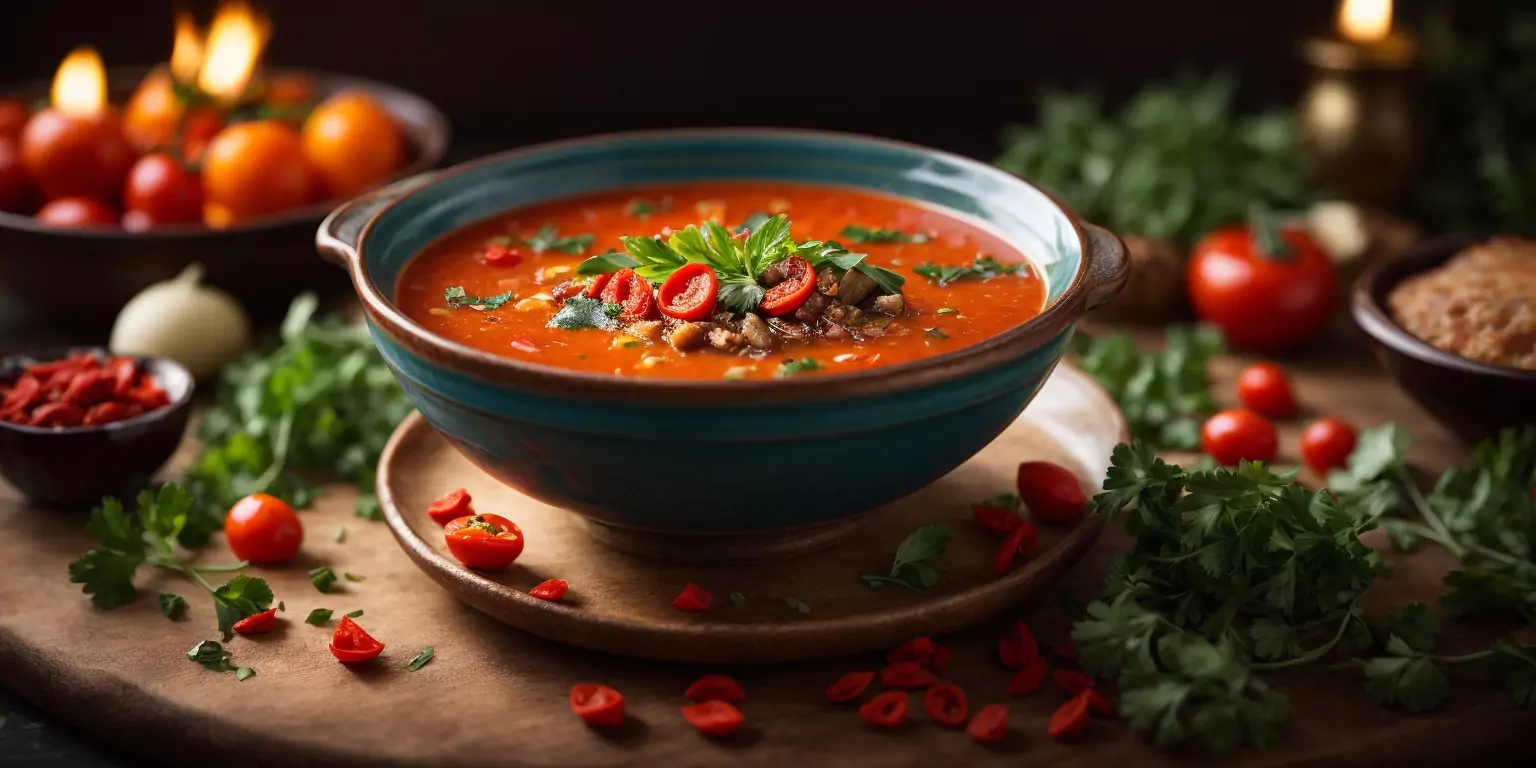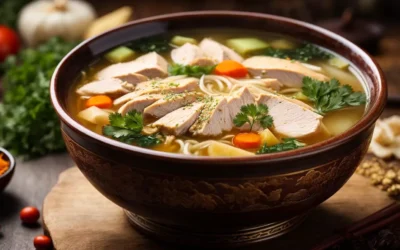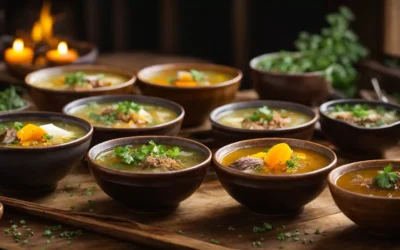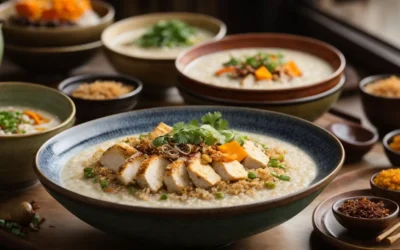Ever wondered about the secret to a balanced and nourishing dinner? Dive into the world of TCM dinner recipes to unlock ancient wisdom that promotes holistic health. Discover how these recipes not only tantalize your taste buds but also align with the principles of Traditional Chinese Medicine and food therapy, offering a myriad of benefits for your well-being. Embrace this time-honored approach to cooking, recipe, and eating, and experience the harmony it brings to your dinners.
- TCM Nutrition Principles for Dinner
- Optimize Digestion with TCM-Approved Recipes
- Wholesome Breakfast Options Transitioning to Dinner
- Nourishing Lunch Ideas Leading to a TCM Dinner
- Soul-Soothing Soups as a Dinner Staple
- Incorporating Key TCM Ingredients into Evening Meals
- Satisfying Sweet Treats Following TCM Guidelines
- Conclusion: Embracing TCM for Holistic Health
- Frequently Asked Questions
TCM Nutrition Principles for Dinner
Importance of Balance
In Traditional Chinese Medicine (TCM), dinner plays a crucial role in maintaining balance within the body. It’s essential to understand the significance of incorporating a variety of food groups, including veggies, into your evening meal. By cooking veggies, you can ensure that your body receives all the necessary nutrients it needs to function optimally.
A balanced TCM dinner consists of a combination of different flavors, temperatures, and food. For instance, including sweet, salty, bitter, sour, and pungent flavors in your meal can help maintain harmony within the body according to TCM principles.
Warming and Cooling Foods
In TCM nutrition for dinner, there is an emphasis on consuming warming veggies or cooling foods based on individual needs. Warming foods are believed to generate heat within the body and promote circulation while cooling foods are thought to reduce heat and have a calming effect.
For example:
- Warming foods: ginger, garlic, cinnamon
- Cooling foods: cucumber, lettuce, watermelon
Optimize Digestion with TCM-Approved Recipes
Herbal Infusions
Herbal infusions are a cornerstone of Traditional Chinese Medicine (TCM) dinner recipes. These infusions often include digestive herbs and spices like ginger, peppermint, and fennel. For instance, ginger is known for its ability to soothe the stomach and aid digestion. Peppermint can help relax the muscles in the digestive tract, promoting smoother digestion.
In TCM dinners, herbal infusions and food are used as a pro tip to support optimal digestion by stimulating the digestive organs. By incorporating these natural remedies and food into your dinner routine, you can promote healthy digestion while enjoying flavorful beverages that complement your meal.
Balanced Meal Combinations
TCM-approved recipes emphasize creating balanced meals that support overall well-being and specifically target digestive issues. A typical TCM dinner includes a combination of cooked vegetables, whole grains or legumes, lean proteins such as fish or tofu, and small amounts of healthy fats like olive oil or avocado.
Wholesome Breakfast Options Transitioning to Dinner
Versatile Ingredients
Wholesome breakfast options in Traditional Chinese Medicine (TCM) can seamlessly transition into dinner by utilizing versatile ingredients. For example, incorporating rice and vegetables from a nourishing breakfast congee into a stir-fry for dinner aligns with TCM principles of balance and harmony. These ingredients provide essential nutrients that support overall well-being, making them ideal for both morning and evening meals.
In TCM, the emphasis is on using whole foods such as grains, legumes, fruits, and vegetables to create balanced meals. By understanding the properties of different foods according to TCM principles, it becomes possible to transform breakfast staples like oats or millet into hearty soups or stews for dinner. This approach ensures that the body receives sustained nourishment throughout the day while promoting digestive health.
Applying TCM Principles
Applying TCM principles to create nourishing dinners from breakfast foods involves considering the energetic properties of ingredients. For instance, eggs commonly consumed at breakfast can be incorporated into vegetable-based dishes for dinner to maintain a harmonious balance between yin and yang energies in accordance with TCM philosophy. Using warming spices like ginger or cinnamon in both breakfast porridges and evening meals supports digestion and promotes internal balance.
- Wholesome ingredients can be repurposed from morning dishes into satisfying dinners
- Understanding the energetic properties of food is crucial when transitioning wholesome breakfast options
Nourishing Lunch Ideas Leading to a TCM Dinner
Continuity in TCM Meals
Transitioning from a nourishing lunch to a TCM dinner involves maintaining continuity in the selection of ingredients and their properties. In Traditional Chinese Medicine (TCM), the concept of continuity is crucial for promoting overall well-being. By ensuring that the lunch and dinner meals complement each other, individuals can maximize the benefits of TCM principles throughout the day.
Incorporating elements such as flavors, temperatures, and specific food groups into both lunch and dinner aligns with TCM’s emphasis on balance within meals. For example, if your nourishing lunch includes foods that are considered cooling according to TCM principles, you might want to include warming ingredients in your dinner recipes to strike a harmonious balance.
Guided Ingredient Selection
When planning for a balanced TCM dinner, it’s essential to consider how different ingredients affect the body according to traditional Chinese medicinal beliefs. Ingredients like gong (a type of mushroom) can be included in both lunch and dinner dishes due to their versatile nature. These mushrooms are believed to have various health benefits according to TCM, making them suitable for inclusion across multiple meals throughout the day.
Soul-Soothing Soups as a Dinner Staple
Healing Properties
Soul-soothing soups are a cornerstone of Traditional Chinese Medicine (TCM) dinners. They offer a myriad of healing properties, in line with TCM principles. These soups often feature ingredients that help balance the body’s yin and yang energies, promoting overall health and well-being. For example, soups made with cooling ingredients like bitter melon can help reduce excess internal heat, while those incorporating warming elements such as ginger can aid in improving circulation and digestion.
Incorporating TCM soup recipes into your dinner routine allows you to harness the therapeutic benefits of various nutrient-rich ingredients. For instance, using goji berries in soups not only enhances flavor but also infuses the meal with antioxidants that support healthy blood circulation according to TCM beliefs.
Nutrient-Rich Ingredients
TCM soup recipes typically include an array of vegetables, meats, and herbs renowned for their nutritional value and healing properties. Vegetables like lotus root or winter melon are often featured due to their ability to nourish different organs within the body based on TCM principles. Fish is commonly used for its high protein content and omega-3 fatty acids which promote heart health – an essential aspect of holistic well-being according to TCM philosophy.
Consider incorporating a variety of nutrient-dense foods such as leafy greens, mushrooms, and lean meats like chicken or pork. By doing so, you’ll be able to craft meals that not only satisfy hunger but also contribute positively to your overall health through the lens of Traditional Chinese Medicine.
Incorporating Key TCM Ingredients into Evening Meals
Key TCM Ingredients
Incorporating TCM dinner recipes involves using key traditional Chinese medicine (TCM) ingredients. These include ginger, garlic, goji berries, and shiitake mushrooms. These ingredients are not only flavorful but also packed with essential vitamins and nutrients.
These TCM ingredients can be incorporated into evening meals to enhance their nutritional value. For example, adding ginger to stir-fries or soups not only imparts a unique flavor but also provides digestive benefits according to TCM principles.
Enhancing Nutritional Value
When incorporating these key TCM ingredients into evening meals, it’s crucial to understand how they contribute to the overall nutritional value of the dish. For instance, including goji berries in a grain-based salad adds a pop of color and sweetness while providing a dose of antioxidants and vitamins.
Balancing flavors and textures is another important aspect when creating TCM-inspired dinners. By combining sweet (goji berries), sour (vinegar), bitter (bitter melon), salty (soy sauce), and pungent (ginger) flavors along with different textures such as crunchy (water chestnuts) or tender (tofu), you achieve harmony in your meal according to TCM principles.
Satisfying Sweet Treats Following TCM Guidelines
Healthier Alternatives
You can indulge in satisfying sweet treats while still following TCM guidelines. Instead of using refined sugar, consider incorporating natural sweetness from fruit like jujube dates. These fruits are rich in essential minerals and can be used to make delicious, TCM-friendly desserts.
In the realm of TCM principles, it’s essential to discover healthier alternatives to traditional desserts. For example, instead of heavy cakes or pastries, consider making a warm dessert soup using jujube dates and other nourishing ingredients. This approach not only satisfies your sweet tooth but also aligns with the moderation and balance advocated by TCM for a fulfilling dinner experience.
Moderation and Balance
When incorporating sweet treats into a TCM dinner, moderation and balance play crucial roles. By using fruits like jujube dates as natural sweeteners, you can create desserts that provide both satisfaction and nutritional benefits without overwhelming your system with excessive sugar intake. Embracing these principles allows you to enjoy the sweetness of desserts while respecting the holistic approach of TCM toward overall well-being.
- Use natural fruit sweetness
- Create warm dessert soups with nourishing ingredients
- Embrace moderation for a balanced approach
Conclusion: Embracing TCM for Holistic Health
You’ve unlocked the secrets of TCM dinner recipes and embraced the wisdom of holistic health. By incorporating TCM nutrition principles into your evening meals, you’re optimizing digestion and nourishing your body in harmony with nature. From soul-soothing soups to satisfying sweet treats, you’ve learned to incorporate key TCM ingredients into your dinner, promoting balance and well-being.
Now, it’s time to continue this journey of holistic health. Explore new TCM-approved recipes, experiment with different ingredients, and share your newfound knowledge with others. Embracing TCM is not just a lifestyle but a commitment to nurturing your body and soul. Keep exploring, keep learning, and keep nourishing yourself in the most wholesome way possible.
Frequently Asked Questions
What are the key principles of TCM nutrition for dinner?
TCM emphasizes balance and harmony in meals, incorporating warm, cooked foods and specific ingredients to support digestion and overall well-being. It also encourages mindful eating and moderation to nurture the body’s natural rhythms.
How can I incorporate TCM-approved recipes into my evening meals?
You can integrate TCM-approved recipes by focusing on warm, nourishing dishes using ingredients like ginger, garlic, and warming spices such as cinnamon. Embrace cooking methods like steaming, simmering, or stir-frying to preserve the vital energy of the food.
What are some soul-soothing soups that align with TCM principles for dinner?
Soul-soothing soups like bone broth-based soups with added root vegetables or herbal tonics made from astragalus root can be excellent choices. These options not only provide warmth but also offer nourishment while supporting various aspects of health according to TCM principles.
Can I enjoy sweet treats following TCM guidelines?
Yes! You can savor satisfying sweet treats within the framework of TCM by utilizing natural sweeteners such as honey or dates in moderation. Incorporating warming spices like cardamom or cinnamon into desserts aligns with promoting balance in accordance with traditional Chinese medicine.
How does embracing TCM contribute to holistic health?
Embracing TCM supports holistic health by nurturing a balanced mind-body connection through mindful eating practices and emphasis on whole foods. This approach encourages individuals to cultivate a deeper understanding of their bodies’ needs while fostering gratitude for the nourishment provided by nature’s bounty.










